Emergency HVAC Thrybergh
Find Emergency Furnace Repair in Thrybergh
Get up to 3 Emergency AC Repair quotes for your project today! Compare profiles, reviews, accreditations, portfolio, etc... and choose the best deal.
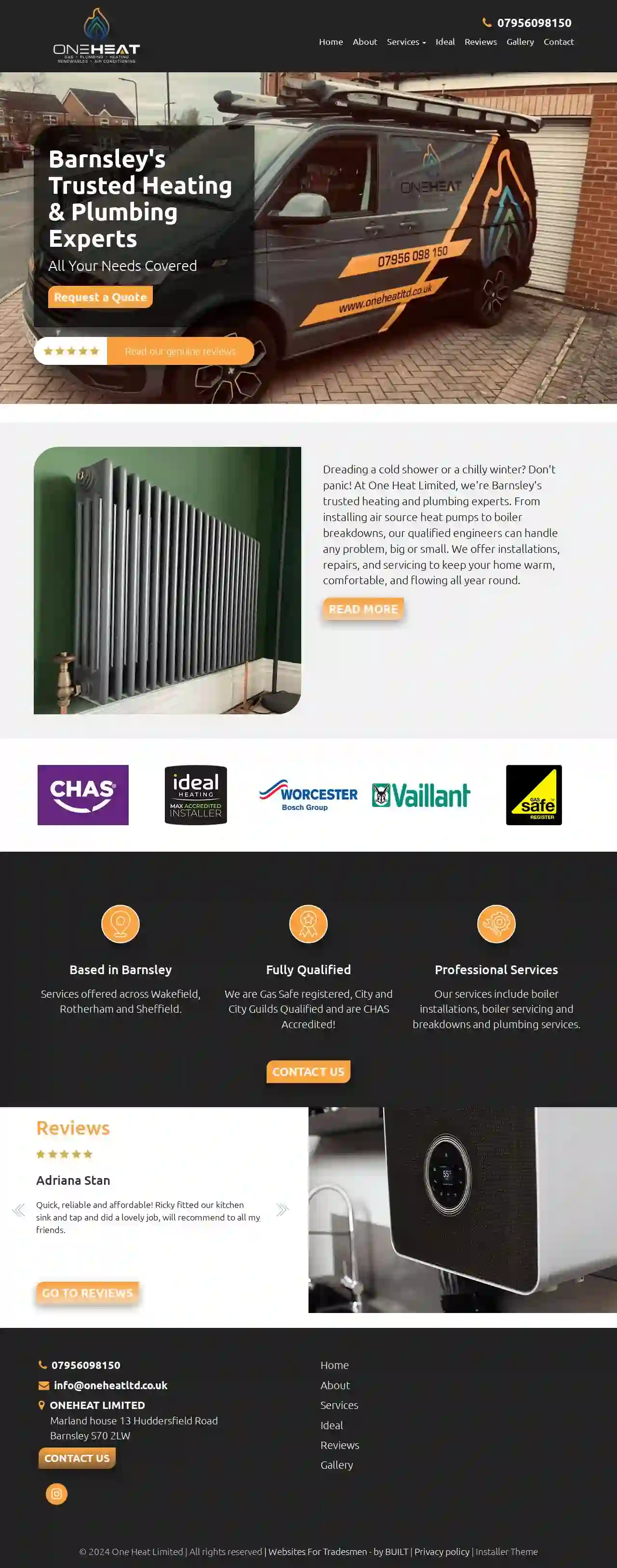
OneHeat Ltd
4.946 reviewsMarland house 13 Huddersfield Road, Barnsley, S70 2LW, GBAt One Heat Limited, we're Barnsley's trusted heating and plumbing experts. From installing air source heat pumps to boiler breakdowns, our qualified engineers can handle any problem, big or small. We offer installations, repairs, and servicing to keep your home warm, comfortable, and flowing all year round.
- Services
- Why Us?
- Accreditations
- Our Team
- Testimonials
- Gallery
Get Quote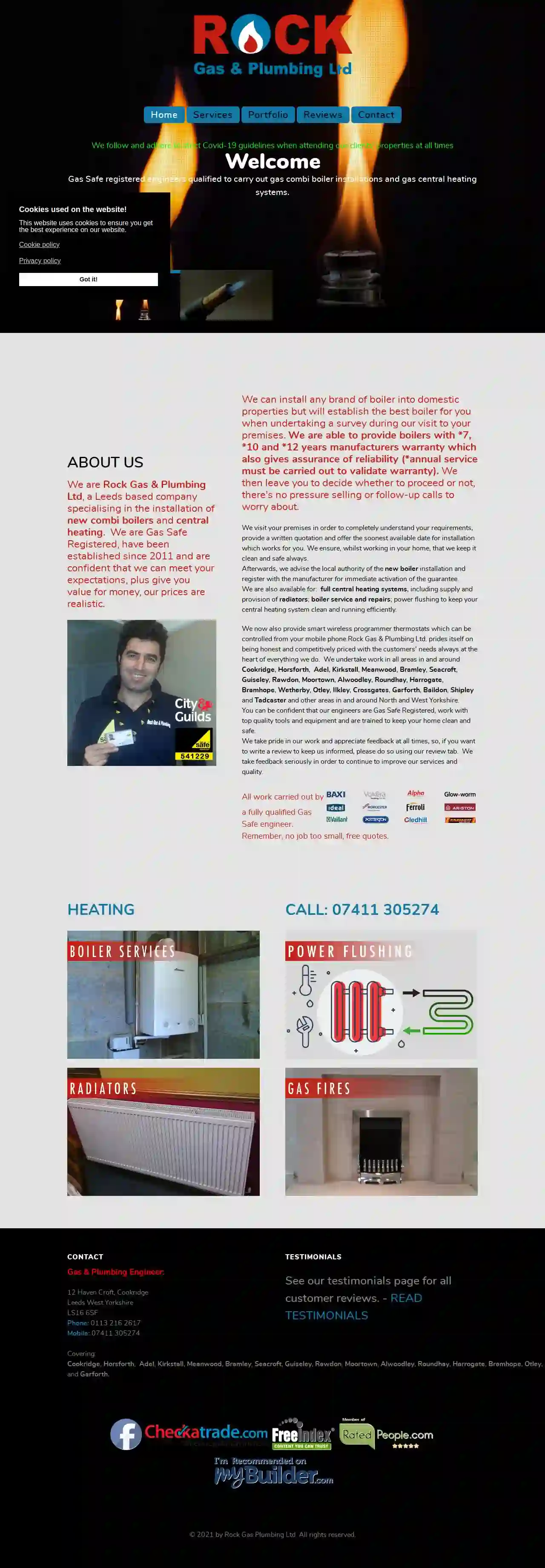
ROCK GAS & PLUMBING LTD
528 reviews12 Haven Croft, Leeds, LS16 6SF, GBWelcome to Rock Gas & Plumbing Ltd, a Leeds based company specialising in the installation of new combi boilers and central heating. We are Gas Safe Registered, have been established since 2011 and are confident that we can meet your expectations, plus give you value for money, our prices are realistic. We can install any brand of boiler into domestic properties but will establish the best boiler for you when undertaking a survey during our visit to your premises. We are able to provide boilers with *7, *10 and *12 years manufacturers warranty which also gives assurance of reliability (*annual service must be carried out to validate warranty). We then leave you to decide whether to proceed or not, there's no pressure selling or follow-up calls to worry about. We visit your premises in order to completely understand your requirements, provide a written quotation and offer the soonest available date for installation which works for you. We ensure, whilst working in your home, that we keep it clean and safe always. Afterwards, we advise the local authority of the new boiler installation and register with the manufacturer for immediate activation of the guarantee. We are also available for: full central heating systems, including supply and provision of radiators; boiler service and repairs; power flushing to keep your central heating system clean and running efficiently. We now also provide smart wireless programmer thermostats which can be controlled from your mobile phone. Rock Gas & Plumbing Ltd prides itself on being honest and competitively priced with the customers' needs always at the heart of everything we do. We undertake work in all areas in and around Cookridge, Horsforth, Adel, Kirkstall, Meanwood, Bramley, Seacroft, Guiseley, Rawdon, Moortown, Alwoodley, Roundhay, Harrogate, Bramhope, Wetherby, Otley, Ilkley, Crossgates, Garforth, Baildon, Shipley and Tadcaster and other areas in and around North and West Yorkshire.
- Services
- Why Us?
- Accreditations
- Our Team
- Testimonials
- Gallery
Get Quote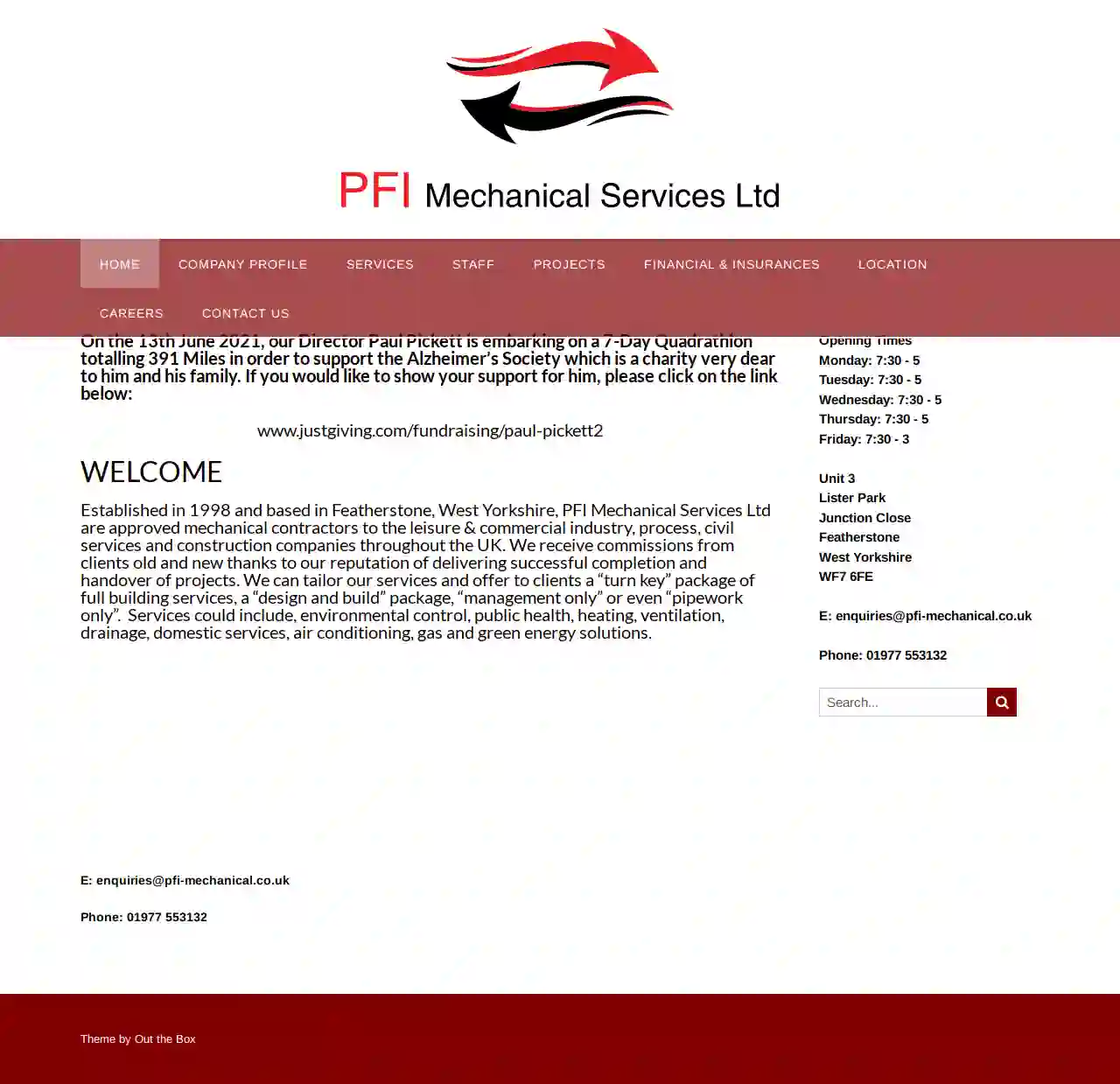
P F I Mechanical Services Ltd
Lister Park, Junction Close, Unit 3, Featherstone, WF7 6FE, GBEstablished in 1998 and based in Featherstone, West Yorkshire, PFI Mechanical Services Ltd are approved mechanical contractors to the leisure & commercial industry, process, civil services and construction companies throughout the UK. We receive commissions from clients old and new thanks to our reputation of delivering successful completion and handover of projects. We can tailor our services and offer to clients a “turn key” package of full building services, a “design and build” package, “management only” or even “pipework only”. Services could include, environmental control, public health, heating, ventilation, drainage, domestic services, air conditioning, gas and green energy solutions. Opening Times Monday: 7:30 - 5 Tuesday: 7:30 - 5 Wednesday: 7:30 - 5 Thursday: 7:30 - 5 Friday: 7:30 - 3 Unit 3 Lister Park Junction Close Featherstone West Yorkshire WF7 6FE
- Services
- Why Us?
- Gallery
Get Quote
ProTecBoilers Pontefract
Pontefract, Tanshelf Drive, WF8 4DJ, GBProTecBoilers is a family business based in Lofthouse, providing professional heating services across Leeds, Wakefield, and surrounding areas. We pride ourselves on offering the best advice and ensuring any heating system is cost-effective and suitable for your home. Our team is City & Guilds qualified, fully insured, and all our work comes with a guarantee, giving you peace of mind knowing we're there when you need us. We offer a comprehensive range of services, including new boiler installations, full central heating system setups, boiler servicing, gas fire and cooker services, landlord certificates, and repairs for all boiler makes and models.
- Services
- Why Us?
- Accreditations
- Gallery
Get Quote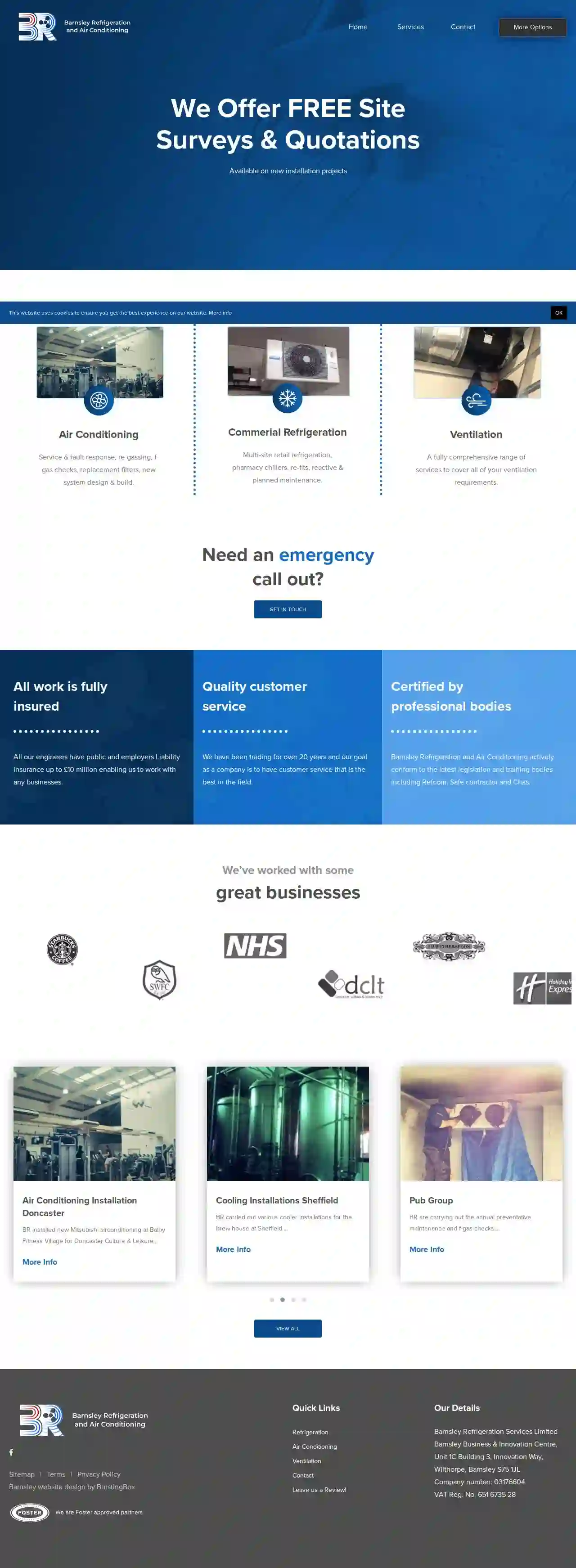
BR Cooling Maintenance
Barnsley Business & Innovation Centre, Unit 1C Building 3, Innovation Way, Wilthorpe, Barnsley, S75 1JL, GBBarnsley Refrigeration and Air Conditioning are a leading provider of refrigeration, air conditioning and ventilation services across Barnsley, Sheffield and Leeds. We offer a comprehensive range of services, from reactive maintenance to new installations, covering a variety of sectors including foodservice, retail and construction. With over 20 years of experience, we pride ourselves on delivering exceptional customer service and quality workmanship. Our team of qualified engineers are fully insured and certified by professional bodies such as Refcom, Safe Contractor and Chas, ensuring we meet the highest industry standards. We understand the importance of reliable and efficient climate control systems, which is why we offer 24/7 call-out services 365 days a year. Whether you need a routine service, emergency repair or a brand new system, we're here to help. Contact us today for a FREE site survey and quotation.
- Services
- Why Us?
- Accreditations
- Testimonials
- Gallery
Get Quote
Hearth & Home Ltd
4.796 reviews351 - 353 London Road, Sheffield, S2 4NG, GBEstablished for over 40 years, Hearth & Home is a family run fireplace showroom on London Road in Sheffield. We have a vast amount of experience supplying & installing multi fuel & wood burning stoves, gas & electric fires & fireplaces. We supply a wide range of stylish fireplaces and surrounds for every type of home - why not have a look through some of our range? We offer materials such as sandstone, limestone, wood, cast iron and micro-marble. Most of which can be made bespoke to your preferred dimensions. Whether you are looking for a cosy wood burning stove or a versatile multi-fuel stove, we have a huge range of stoves to choose from. All our stoves in the showroom are DEFRA approved and Eco Design compliant. At Hearth & Home Ltd, we can supply gas and electric fires specific to your requirements. You can expect nothing but high-quality products from us. Whether it be inset, stove or wall mounted, we can help. We offer all manner of accessories to help you make the most of your fire. From log baskets and companion sets to firelighters and match holders.
- Services
- Why Us?
- Our Team
- Testimonials
- Gallery
Get Quote
ICH Services
4.522 reviewsRoker Lane, Union Bridge Works, LS28 9LE, GBICH Services provide hard facilities services throughout the United Kingdom. Through management of all types of mechanical maintenance, ICH Services are able to offer complete peace of mind for a single building to a multi property estate. ICH have a proven track record being different to their competitors. Being maintenance led validates their unique obsession with client care. ICH strive to develop long term relationships with all clients, and this year celebrate 29 years in business.
- Services
- Why Us?
- Gallery
Get Quote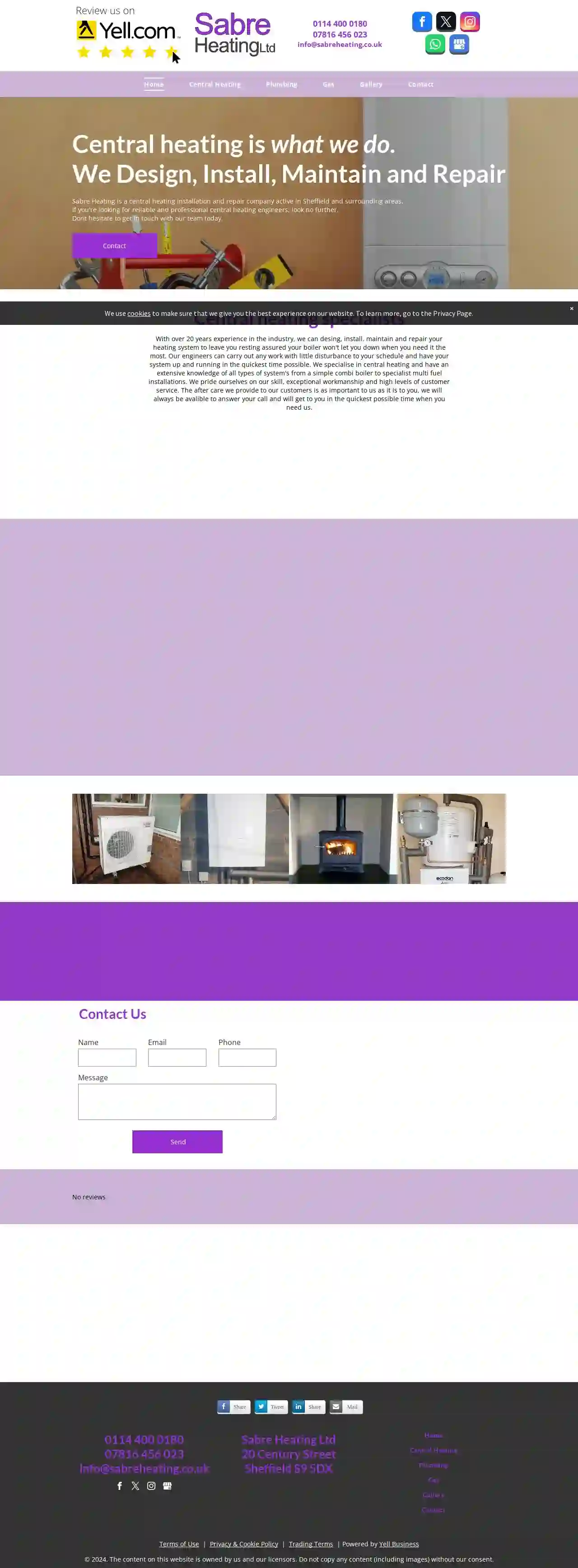
Sabre Heating Ltd
4.931 reviews20 Century Street, Industrial Estate, Clement Street, Sheffield, S9 5DX, GBSabre Heating is a central heating installation and repair company serving Sheffield and the surrounding areas. With over 20 years of experience in the industry, we specialize in designing, installing, maintaining, and repairing heating systems. Our team of Gas Safe registered engineers is committed to providing reliable and professional service, ensuring your boiler won't let you down when you need it most. We work with minimal disruption to your schedule and strive to have your system up and running quickly. We have extensive knowledge of all types of heating systems, from simple combi boilers to specialist multi-fuel installations. We pride ourselves on our skill, exceptional workmanship, and high levels of customer service. We understand that aftercare is just as important as the initial installation, so we are always available to answer your calls and provide prompt assistance when needed. We are not pushy salesmen and will only recommend services you require. A fully trained engineer will handle your enquiry, providing honest and professional advice. Your satisfaction is our priority, and we will ensure you are happy with the work before leaving. We are a friendly and approachable company, so please don't hesitate to contact us for any plumbing and heating enquiries.
- Services
- Why Us?
- Accreditations
- Our Team
- Gallery
Get Quote
Heating Advisory Services
3.36 reviews39 South View Gardens, Pontefract, WF8 2HW, GBWelcome to Heating Advisory Services, Central Heating Specialists. We are expert in the design and installation of gas, oil and LPG heating systems and our continuous commitment to the training and development of our team ensures we provide our customers with the latest innovations in renewable energy products including solar and ground source heating systems. From new bathrooms to underfloor heating, from replacement boilers to complete systems, we work closely with our customers to deliver heating and plumbing solutions tailored to you, your family or your business. Whether domestic, commercial or industrial, we give advice you can trust, expertise you can rely on and a personal service second to none.
- Services
- Why Us?
- Gallery
Get Quote
PJM Plumbing & Gas Ltd
555 reviews73 stanier way, Renishaw, S21 3UU, GBPJM Plumbing and Gas are reliable and professional boiler, gas and heating experts serving South Yorkshire. We offer a wide range of services, from boiler servicing and repairs to full bathroom installations. Our team of Gas Safe registered engineers are fully qualified and compliant with current legislation. We pride ourselves on providing a friendly and efficient service, with free site visits and quotes. We also offer 0% finance options on most new boilers. Whether you need a simple repair or a complete system upgrade, PJM Plumbing and Gas can help. We're committed to providing our customers with the highest quality workmanship and customer service. Contact us today for a free quote.
- Services
- Why Us?
- Accreditations
- Gallery
Get Quote
Over 12,692+ HVAC Companies on our directory
Our HVAC contractors operate in Thrybergh & surrounding areas!
HVACCompaniesHub has curated and vetted the Best HVAC Businesses arround Thrybergh. Find the most reliable business today.
Frequently Asked Questions About Emergency HVAC Services
- Uneven Temperatures: Some rooms in your house might be significantly hotter or colder than others.
- High Energy Bills: An undersized or oversized system will be inefficient and increase your utility costs.
- Frequent Cycling: An incorrectly sized AC unit will turn on and off more often than it should, which can lead to premature wear and tear.
- Poor Humidity Control: The system may not effectively control humidity levels, leading to discomfort or mold problems.
What's the difference between a single-stage and two-stage furnace?
What is carbon monoxide, and how can it affect my HVAC system?
How do I find an emergency HVAC technician near me?
How can I tell if my HVAC system is the correct size for my home?
What's the difference between a single-stage and two-stage furnace?
What is carbon monoxide, and how can it affect my HVAC system?
How do I find an emergency HVAC technician near me?
How can I tell if my HVAC system is the correct size for my home?
- Uneven Temperatures: Some rooms in your house might be significantly hotter or colder than others.
- High Energy Bills: An undersized or oversized system will be inefficient and increase your utility costs.
- Frequent Cycling: An incorrectly sized AC unit will turn on and off more often than it should, reducing its lifespan.
- Poor Humidity Control: The system may not effectively control humidity levels, leading to discomfort or mold problems.